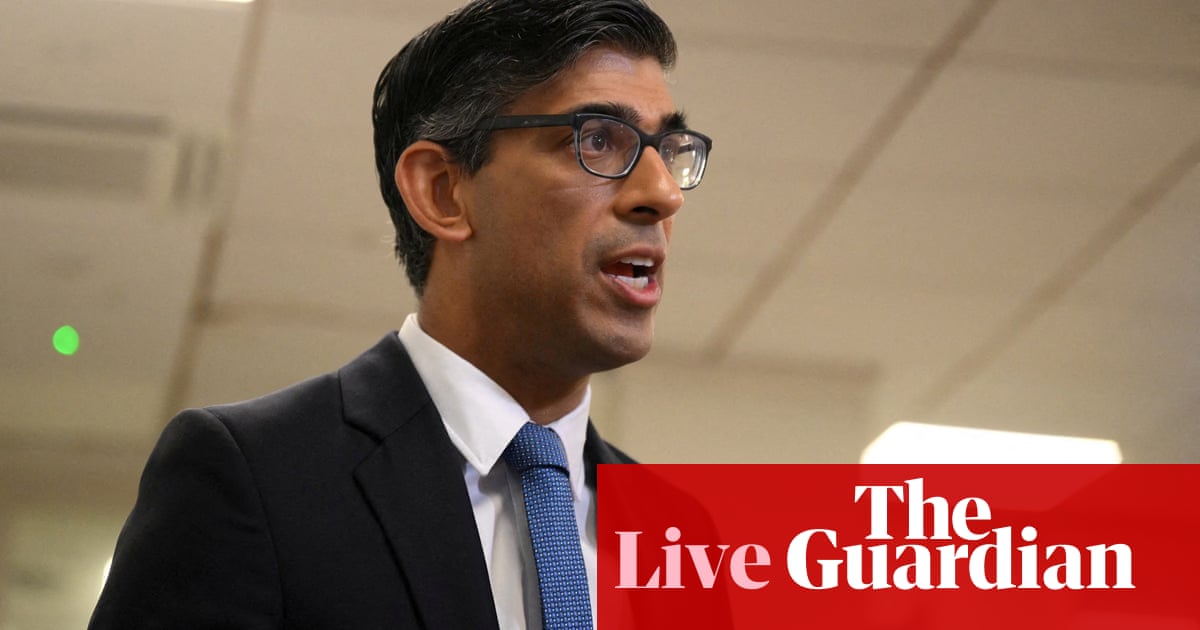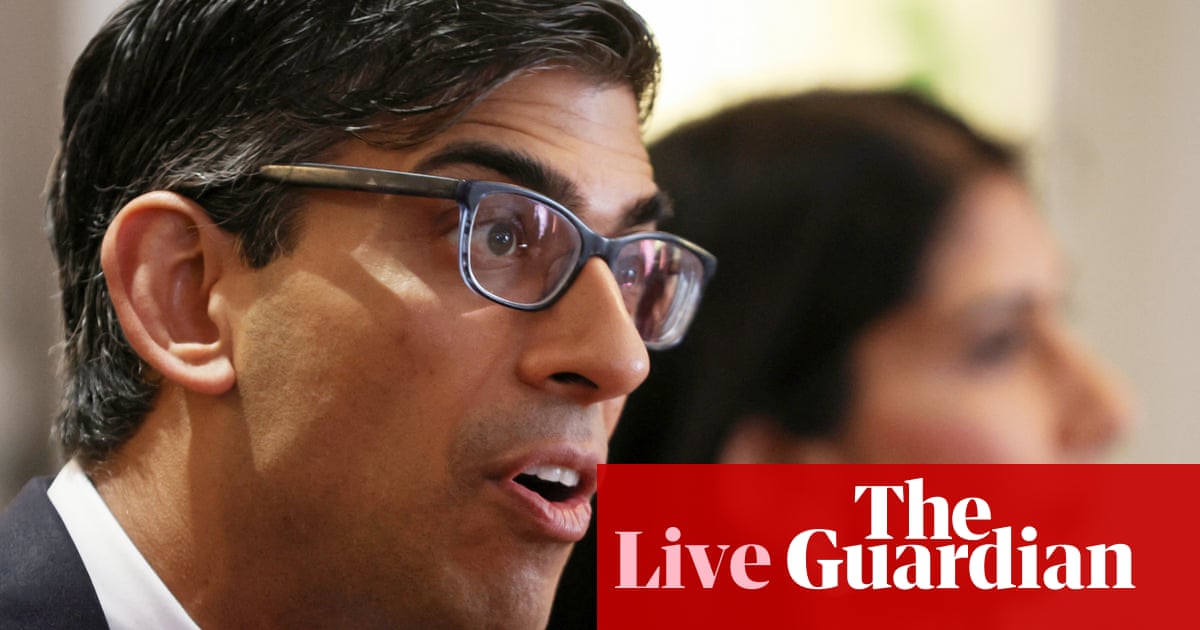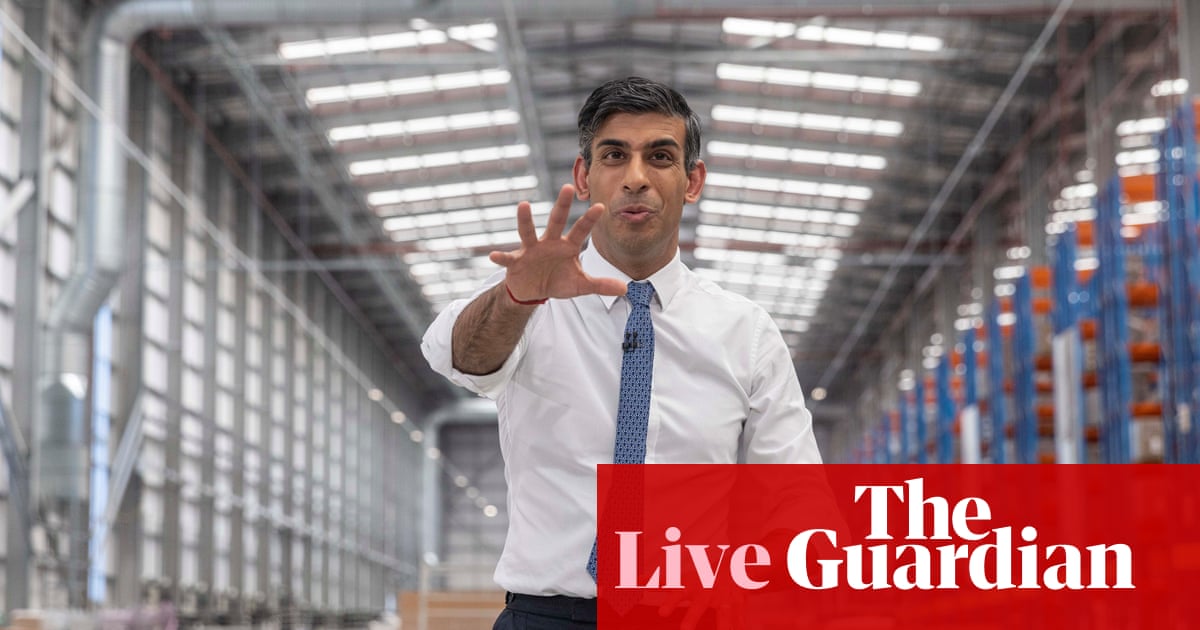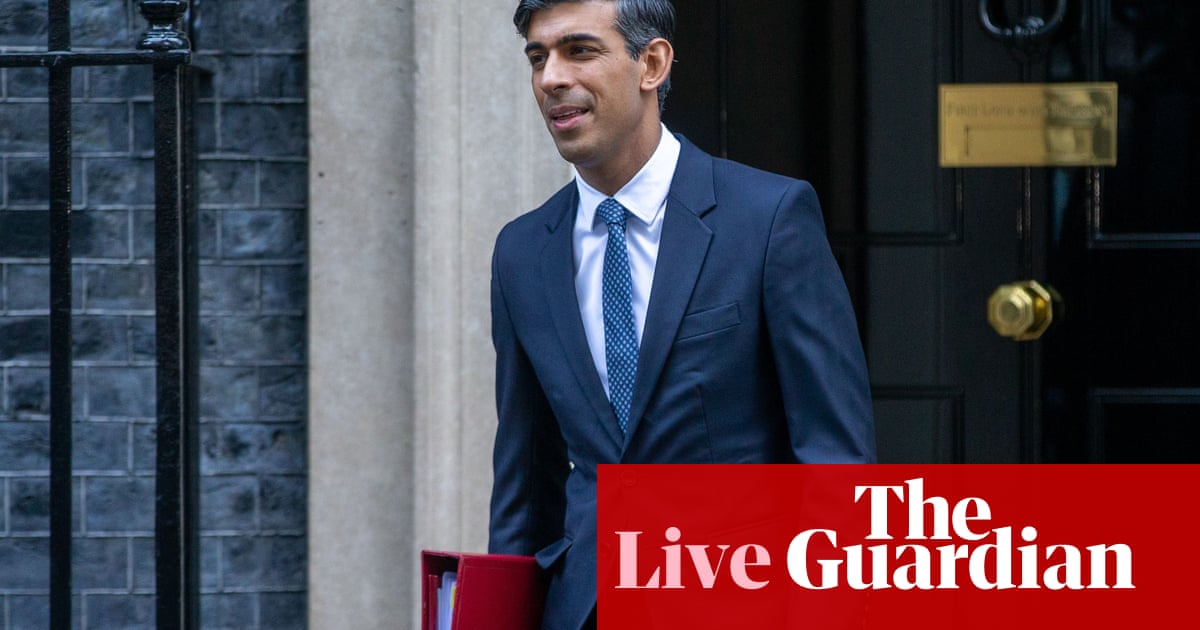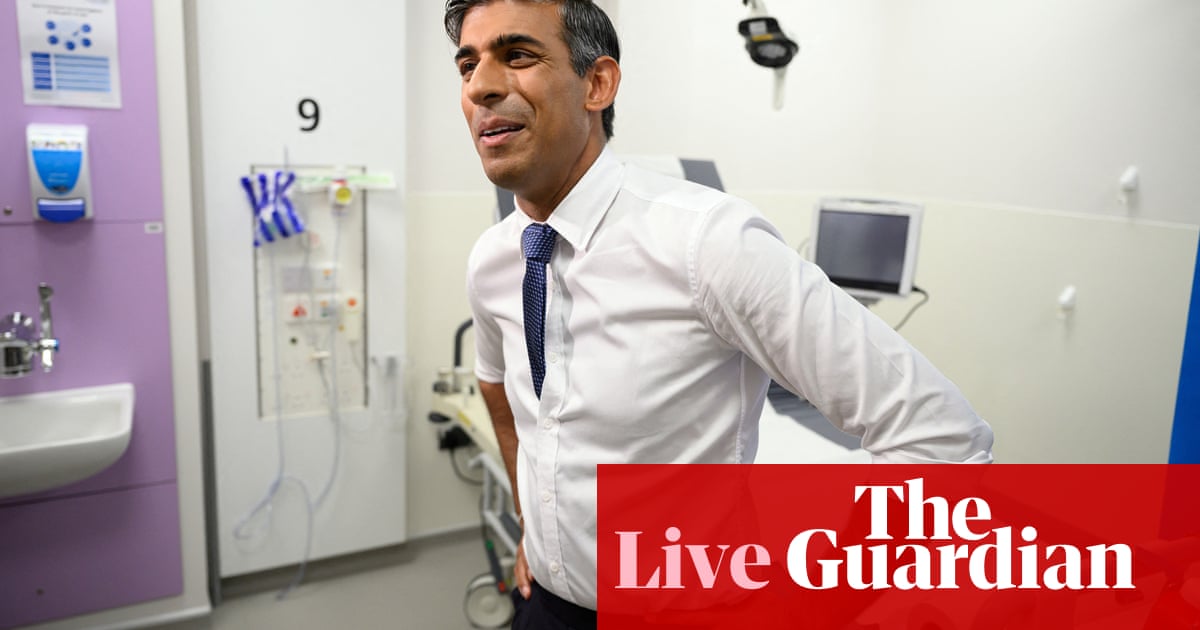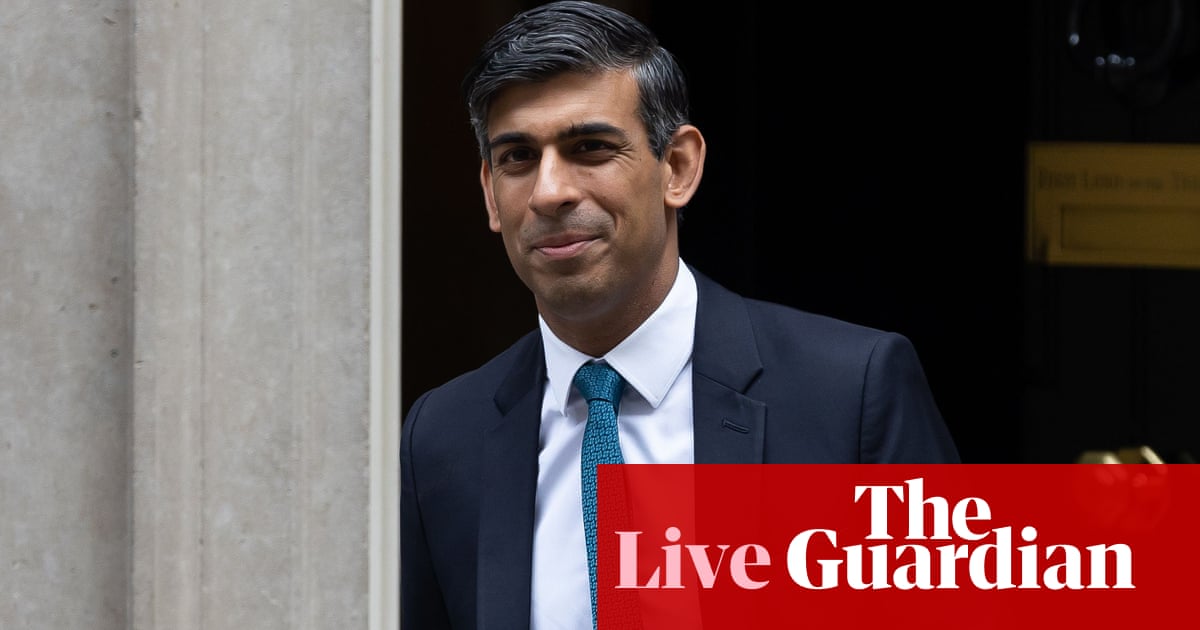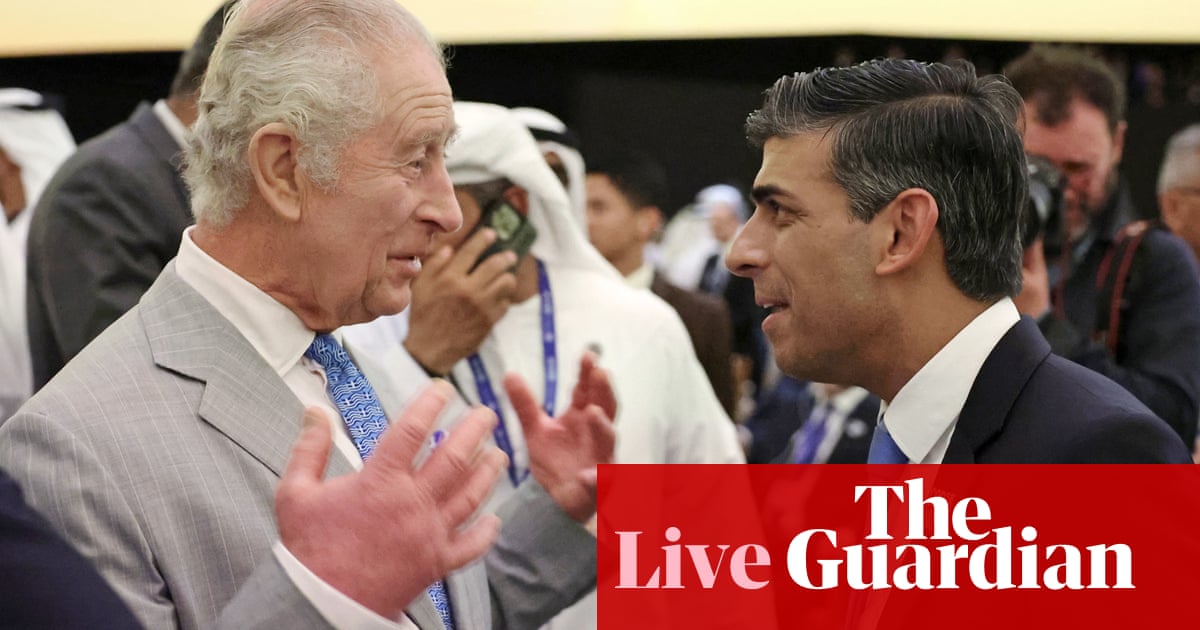
Labour accuses Sunak of protecting super-rich from tax
Labour has accused Rishi Sunak and Jeremy Hunt of shielding the super-rich from paying their fair share of tax by refusing to abolish the non-dom loophole.
Keir Starmer accused the government of having “gone after working people” with tax hikes while doing “nothing about non-dom status”.
He told broadcasters during a visit to Swindon:
The super-rich are not paying their taxes in this country.
The shadow chief secretary to the Treasury, Pat McFadden, said the Conservatives were refusing “to make fairer choices”.
They continue to shield non-doms from paying their fair share of tax in Britain, leaving billions on the table.
The Institute for Public Policy Research estimates that abolishing the non-dom tax status would raise £3bn a year.
Sunak’s wife, Akshata Murty, was forced to say in April she would pay UK taxes on all her worldwide income after they faced criticism over her non-dom status.
It was estimated that Murty, a fashion designer and the daughter of an Indian billionaire, could have saved up to £20m in UK tax through the arrangement.
This week Sunak said he would publish his personal tax return, in a bid for transparency.
Summary of the day
It was a busy morning today as reaction to the chancellor’s autumn statement emerged. Here are all the key points:
The Institute for Fiscal Studies (IFS), a leading thinktank, said in a briefing that the key takeaway from the autumn statement was that the UK had got “a whole lot poorer” after a “series of economic own goals” by the Conservatives, and because of the “extraordinary scale” of spending on debt interest due to high borrowing in recent years, combined with sluggish long-term growth and the pressures of an ageing population.
The IFS director, Paul Johnson, said the tax burden was unlikely to go back to pre-Covid levels for decades, and that threshold freezes meant the country was in a “new era” of high taxation and high public spending. He added that the chancellor, Jeremy Hunt, had done “the minimum he needed to regain credibility” following the disastrous mini-budget of his predecessor Kwasi Kwarteng.
In the morning, broadcasters grilled Hunt about his decision not to abolish the non-dom tax loophole. He defended the move as encouraging the super-rich to stay and continue to spend their money in the UK, which he suggested was good for the economy. Labour accused the chancellor and the prime minister, Rishi Sunak – whose wife is a non-dom – of shielding the super-rich from paying their fair share of taxes.
Hunt also said it had been a “difficult” decision to delay the social care cap, but said that he had to do it for the country.
Hunt also conceded to broadcasters that Brexit had harmed the economy and said the UK needed “unfettered trade” with the European Union.
The latest Ipsos Political Monitor, taken 9-16 November shows the shadow chancellor, Rachel Reeves, would be preferred as chancellor to Hunt, as high levels of economic pessimism persist and Labour retains a healthy poll lead over the Conservatives.
The Resolution Foundation, another leading thinktank, said that Britain’s workers would miss out on pay rises worth £15,000 over the next five years as the chancellor’s tax-heavy budget pressured the nation’s “squeezed middle”. Its research director said Hunt’s cuts did not appear achievable, and that unprotected departments would face George Osborne-style “2014-15 levels of austerity”.
Thanks for following the blog today, we’re closing for the evening but will reopen again on Monday morning. Have a wonderful weekend.
The Guardian’s political correspondent Aubrey Allegretti reports on how a veteran objector has managed to get a private member’s bill through all stages in just three minutes.
Fridays in the Commons are often sleepy – with most MPs back in their constituencies and the few that do hang around in Westminster trying to get their ideas for draft laws put on to the statute book.
They do this through what is called a “private member’s bill”, and these are usually taken and considered by the dozen or so MPs who sit in parliament to listen to such suggestions.
The Tory backbencher Christopher Chope is well-known for his objections, and caused controversy in the past by blocking such bills (including one to outlaw “upskirting”).
This is because he believes bills that have the government’s support but which are introduced through the private member’s bill system are clogging up the method used for backbench MPs to enact their own laws.
It only takes one MP to shout “object” to kibosh a private member’s bill, so it was a great surprise on a normal Friday sitting when Chope managed to get one of his through without a government whip alert enough to block its progress.
The “mobile home pitch fee bill” was presented by Chope, but remained unopposed – meaning it flew through its first reading, second reading, committee stage then report stage, and finally passed its third reading without opposition.
The whole process took three minutes and 11 seconds – a speed remarked upon by the deputy speaker Eleanor Laing, who confirmed it was the first time a private member’s bill had completed all its stages at once since 1998.
She said to laughs from the Commons:
Many a worthy bill has appeared to have support of all members but one.
It is noticeable that this particular bill is brought by that very member and its worthiness has therefore outweighed its procedural position. Interesting and notable.
The Guardian’s education editor, Richard Adams, has spoken to the school leaders’ union to get their view on the autumn statement.
Despite Jeremy Hunt’s extra £2bn for schools in England next year, the Association of School and College Leaders (ASCL) has said it will hold its first ever consultative ballot on industrial action.
Geoff Barton, the general secretary of ASCL, said:
While yesterday’s extra money is welcome, it comes in the context of a decade of real-terms cuts and a teachers’ pay award this year which is both inadequate to improve recruitment and retention and unaffordable because there isn’t enough money for schools to be able to pay it.
We will now be asking members to participate in our consultative ballot and guide our next steps.
The union, which represents many senior leaders in secondary schools, said the consultative ballot “follows a period of extensive consultation … where we heard the strength of our members’ feelings about the continued underfunding of education and the major consequences this is having both for ASCL members and for the children and young people they serve”.
The International Monetary Fund’s managing director, Kristalina Georgieva, has told the chancellor, Jeremy Hunt, that his autumn statement “strikes the right balance”, after the UN financial institution criticised Kwasi Kwarteng’s mini-budget.
She tweeted:
In a call with Chancellor Hunt today, I welcomed [British] autumn statement prepared at a difficult time for the UK economy, against strong global headwinds.
It strikes the right balance between fiscal responsibility and protecting growth & vulnerable households.
The Guardian’s education editor, Richard Adams, reports on the reaction to the chancellor’s decision not to widen eligibility for free school meals:
Campaigners including the celebrity chef Jamie Oliver said they would not give up their efforts to tackle food poverty by widening eligibility for children to receive free school meals, despite having their hopes dashed by Jeremy Hunt’s autumn statement.
The high-profile campaign backed by the chief executives of major supermarkets and chefs such as Oliver and Tom Kerridge, urges the government to extend coverage to the estimated 800,000 children from families in England receiving benefits who are ineligible for free school meals (FSM).
But the Treasury was unmoved, despite support from Conservative MPs for the measure.
Kerridge, who has campaigned on behalf of the Feed The Future coalition, said:
The decision today is a disgrace, especially when MPs get £17m in food subsidies. The government has a moral obligation to these children, the most vulnerable in our society and we will not stop fighting for these kids.
I ask all government ministers to put themselves in the shoes of these parents, to put themselves in the shoes of these children and do the right thing and extend school meals. No child should be going to school hungry.
Oliver said:
Every day kids are asked to not give up and to keep trying at school. I just wanted to let the education secretary, Gillian Keegan, know that we won’t give up until every kid who needs it has access to a free school meal.
Only children whose households receive universal credit and earn less than £7,400 net of taxes and benefits are eligible for FSM in England. The £7,400 ceiling on earnings has not risen since 2018, and the Liberal Democrats argue that up to 110,000 more children would be eligible for FSM if the ceiling had risen in line with inflation to £8,575.
Labour accuses Sunak of protecting super-rich from tax
Labour has accused Rishi Sunak and Jeremy Hunt of shielding the super-rich from paying their fair share of tax by refusing to abolish the non-dom loophole.
Keir Starmer accused the government of having “gone after working people” with tax hikes while doing “nothing about non-dom status”.
He told broadcasters during a visit to Swindon:
The super-rich are not paying their taxes in this country.
The shadow chief secretary to the Treasury, Pat McFadden, said the Conservatives were refusing “to make fairer choices”.
They continue to shield non-doms from paying their fair share of tax in Britain, leaving billions on the table.
The Institute for Public Policy Research estimates that abolishing the non-dom tax status would raise £3bn a year.
Sunak’s wife, Akshata Murty, was forced to say in April she would pay UK taxes on all her worldwide income after they faced criticism over her non-dom status.
It was estimated that Murty, a fashion designer and the daughter of an Indian billionaire, could have saved up to £20m in UK tax through the arrangement.
This week Sunak said he would publish his personal tax return, in a bid for transparency.
A small point on the Ipsos Mori polling on Hunt. Reader
@ds9074, states in the comments: “I’m pretty certain Kwasi Kwarteng would have had an even lower rating, he just wasn’t in the job long enough for them to conduct a poll!”
Others have wondered the same, and indeed Ipsos Mori points out that the question “Who would make the most capable chancellor … was not asked during Kwasi Kwarteng’s short period in office.”
The Times’ Rachel Sylvester and Alice Thomson have a long, in-depth interview with Keir Starmer today, which the Labour leader’s team is likely to be delighted with.
It paints a broadly positive picture of Starmer, who talks in depth about the impact of his mother’s illness on his life, his working-class roots and his approach to politics.
Starmer talks about his mother’s illness – she was diagnosed with Still’s disease, an aggressive juvenile form of arthritis, when she was 11 – and how “towards the end of her life she couldn’t walk. She couldn’t really move her limbs. She couldn’t feed herself. In the end, she couldn’t speak.”
He says her determination to confront problems head-on informed his own attitude:
If anything it has given me determination and courage to run towards a problem, run towards a challenge, and overcome it, that’s all come from the steely resolve of my mum.
On his background, the interviewers write:
With his knighthood, his smart suits, his smooth lawyer’s manner and his north London home, Starmer looks like he was born into the liberal metropolitan elite. But his childhood was far from privileged. He is convinced that his tough upbringing was a good preparation for the political battles he has faced.
Starmer says:
My dad worked in a factory all his life. My mum was a nurse, but she soon became too busy with four children and too ill to carry on working. I’m not going to plead poverty or any greater hardship than anyone else, but it was tough going at times. Our phone was cut off. The carpet on the stairs was threadbare. We didn’t feel poor, we didn’t feel put upon – it was just the way it was.
[…]
One of the things that helps me in the cost-of-living crisis we’re going through now is knowing what it’s like to struggle to make ends meet. Many people this winter are worrying about how they can pay their bills and I know what that feels like.
The piece provides an interesting insight how Starmer and his shadow ministers are already preparing for government. They write:
The former director of public prosecutions, who spent his legal career painstakingly building up evidence, is leaving nothing to chance. His frontbenchers are already having masterclasses about running Whitehall departments and Starmer himself has started taking advice about being prime minister.
They quote him saying:
I’ve been talking to Tony Blair and Gordon Brown for some time now. I’m conscious that we’ve been out of power for 12 years. That means I don’t have people around the shadow cabinet table who’ve got huge experience in government. So I’m determined that we need to be ready to hit the ground running.
And if Starmer does make it to No 10, he and wife, Victoria – who works for the NHS in occupational health – are apparently unlikely to do an expensive makeover.
Starmer says:
I don’t think it’s going to be to my taste. There will be no stories about what we’re doing to redecorate if we get that far, but as Vic always says, one step at a time.
Poll: shadow chancellor Rachel Reeves preferred to Jeremy Hunt
Jeremy Hunt is already as unpopular as George Osborne was after the 2012 omnishambles budget, according to polling from Ipsos Mori, carried out last week before the Autumn Statement.
The latest Ipsos Political Monitor, taken 9-16 November shows Shadow Chancellor Rachel Reeves preferred as Chancellor to the Conservatives’ Jeremy Hunt as high levels of economic pessimism persist and Labour retains a healthy poll lead over the Conservatives.
When asked who would make the most capable Chancellor, 35% opted for Labour Shadow Chancellor Rachel Reeves and 29% for the current Conservative Chancellor Jeremy Hunt, says the pollster.
This is the first time a Labour Shadow Chancellor has led since June 2013 when Ed Balls led George Osborne by 38% to 35%
Nicola Sturgeon has said Scotland’s budget for next year will be a “difficult balancing act”.
Responding to the Chancellor’s autumn statement made on Thursday, the First Minister wrote in the Daily Record newspaper that - “despite repeated requests” - there would be no support for the Scottish government to deal with inflationary pressures in this year’s budget.
Instead, some £1.5bn in Barnett consequentials will made available to the devolved administration over the next two years, described by Jeremy Hunt as “extra help”.
She wrote:
Over the coming days, officials will scrutinise the numbers to understand precisely what the chancellor’s statement means for next year’s Scottish budget, which will be presented to Parliament on 15 December.
It clearly will be a difficult balancing act, but we will do all we can within our limited resources to mitigate the impact of the cost of living crisis on Scotland’s families and businesses and continue building a fairer, greener and more prosperous Scotland.
Key points from the IFS briefing
Here are the main takeaways from the Institute of Fiscal Studies’ briefing on the autumn statement this morning:
The UK has got “a whole lot poorer” after a “series of economic own goals” and because of the “extraordinary scale” of spending on debt interest due to high borrowing in recent years, combined with sluggish long-term growth and the pressures of an ageing population.
The economic own goals include Brexit, political instability, slashing investment spending, cutting education spending and the mini-budget.
We are in a “new era” of higher taxation, higher spending as a fraction of national income and a bigger state, with more people being pulled into the higher rate of taxation due to a plan to freeze thresholds for six years.
The autumn statement isn’t a particularly “fiscally conservative statement”, and postpones big spending cuts until after the next general election, with spending rising in the interim period. The chancellor is probably hoping for easing the debt burden to become someone else’s problem, or to be resolved by economic growth.
Although spending is rising, this follows years of cuts and in many areas such as healthcare doesn’t compensate for increased costs.
The two-year delay to implementing social care reforms may be a “death knell” for the policy.
There will be the biggest fall in income growth over a two year period possibly ever following a “painful decade” – those on middling incomes will be worst hit.
This was a “tax-raising budget”, but the chancellor opted for “easy revenue raisers rather than coherent reform” – this is “not a good way to make policy”.
Real household disposable incomes will fall by 7% over the next two years – the largest since records began.
Governments have opted to pursue political priorities rather than economic growth in recent years.
The IFS briefing has now wrapped up, but you can catch up on director Paul Johnson’s opening remarks and see all the graphs and slides on their website here.
Schools spending is growing in real terms, says the IFS’s Ben Zaranko, but he warns that this follows 15 years of lost schools funding growth so the picture is not as rosy as it might sound.
Emmerson added that this applied to other areas – after years of spending cuts it is harder to make additional cuts, especially in areas such are healthcare which are grappling with increased costs following the pandemic.
Here’s the Guardian’s city editor Anna Isaac’s full report on the IFS briefing this morning:
Rising rates of people who are off work with long-term sickness, many of whom often don’t return to work, is very concerning for longer term economic growth, says the IFS’s Xiaowei Xu.
This means there is a falling labour supply and – combined with lower immigration – means “we’ll really have to look at how we can get productivity going again”.
Johnson added there are growing numbers of young people on personal independence payments due to mental health problems. “The government needs to get a grip on this,” he said.
Deputy director Carl Emmerson said we need a set of policies that offer “sustianble growth” rather than pumping money into the economy.
Serious tax reform rather than tinkering with tax rates, also education and planning reforms, he suggested.
Doing them isn’t easy and there’s a reason why government shy away, he said.
The returns will be in the long run – if you get education policy right it will take decades to reap the rewards. “There are no quick fixes here,” he said.
Johnson added that governments have prioritised “other things” than growth in recent years.
Brexit was "very clearly" an economic own goal for the government, says IFS director
IFS director Paul Johnson has been pressed by journalists in the Q&A what the “economic own goals” he alluded to in his opening remarks are.
He said they include the following:
Slashing investment spending in 2010, announced by last Labour government but continued by George Osborne. “Not a good way to get growth,” he said.
Cutting spending on education especially “huge cuts” to vocational and further education but also schools. Although schools spending is going up, FE didn’t get a mention in the autumn statement.
Brexit “very clearly” – economically speaking that has been “very bad news indeed” and continues to be, especially because of the hard Brexit and distancing from single market.
The mini-budget “obviously didn’t help” – “another large own goal”.
The general economic and political instability and uncertainty, with three prime ministers and four chancellors in a few months, “and to be reversing policy here, there and everywhere”.
Xu said the uprating of the benefits cap is “welcome” and will come as a relief to families – but in a context where prices have increased by 24% it still represents a big cut since April 2016.
The current uprating is just keeping pace with inflation and real benefit levels won’t return to pre-pandemic levels until April 2024, she added.
Senior research economist Xiaowei Xu says real household disposable incomes will fall by 7% over the next two years.
Since 2008 we’ve seen more shocks than in previous decades – but falls over next two years are the largest since records began. This follows a “lost decade” since 2008.
We won’t return to pre-pandemic levels of household incomes until after 2027/28. We’ll be a third poorer than we would have been had pre-2008 growth trend continnued.
We’re heading for another lost decade despite a large package of government support for the cost-of-living crisis such as the energy price guarantee, she said.




